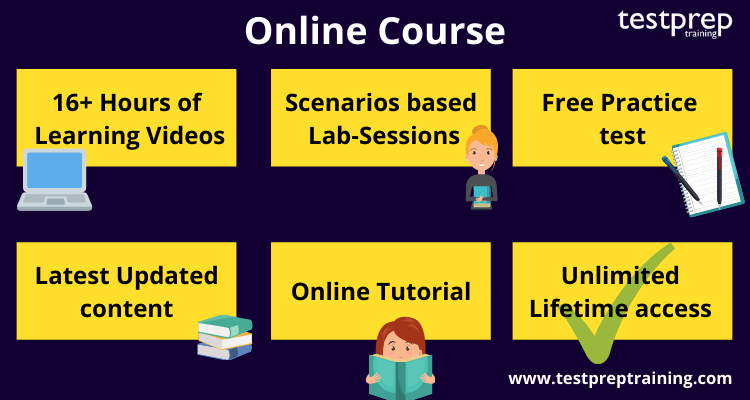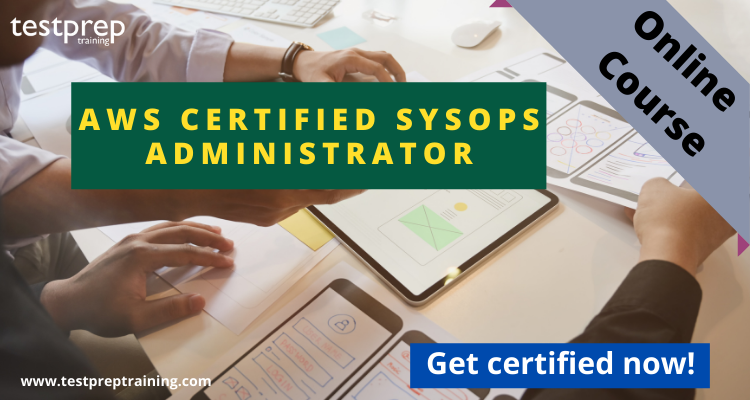The AWS Certified SysOps Administrator – Associate (SOA-C01) exam has a new version – AWS Certified SysOps Administrator – Associate (SOA-C02). Stay updated with the latest changes to earn this certification.
We all know AWS Certified SysOps Administrator exam has been a game-changer for many in their careers. Not only this, but it also helped many develop the skills to work proficiently as a system administrator. Besides, in the era of cloud computing the Amazon Web Services (AWS) is amongst the top cloud provider according to the magic quadrant and manages the global cloud infrastructure. Moreover, AWS holds the market share equivalent to the next four big cloud providers combined. In the same vein, AWS Certified SysOps Administrator is one of the exams developed to build and test skills to work as a proficient System Administrator.
However, it is not an easy task to prepare for this certification. But with the right resources and online courses, you will easily excel in the examination. Our expert teams have put together this article to steer you toward the correct set of resources and online courses that can enhance your preparation. Our AWS Certified SysOps Administrator Online Course is designed by experts to set you on the right track for your exam. Moreover, this course is surely your way ahead to crack the exam and pass. But before we discuss what you learn during the online course, let’s first look at what it takes to prepare for the exam.
Exam Overview
The AWS Certified SysOps Administrator – Associate exam is meant for systems administrators working in a systems operations role, with at least one year of experience in deploying, managing, and operating on AWS.
Here are the job and responsibilities you will get once you clear the exam:
- Firstly, deploying, managing, and running scalable, highly accessible, and fault-tolerant systems on AWS
- Secondly, implementing and controlling the flow of data to and from AWS
- Then, selecting the appropriate AWS service based on compute, data, or security requirements
- Also, identifying appropriate use of AWS operational best practices
- Estimating AWS usage costs and identify operational cost control mechanisms
- Further, migrating on-premises workloads to AWS
AWS Certified SysOps Administrator Online Course
AWS Certified SysOps Administrator – Associate (SOA-C01) Online course has been built to assist you and prepare based on administering applications on AWS from an operations viewpoint. The courseware covers deployment topics as well as deals with decisions to make our environments based on information we receive from monitoring, auditing, and any performance feedback we gather. The AWS Certified SysOps Administrator Associate Online Course has been developed to provide you with the required knowledge to pass the AWS SysOps Administrator certification exam and also gain the hands-on experience to become a qualified AWS Systems Operator working in the real-world environment.
What’s Inside?
- More than 81 + Learning Videos for all Course Objectives (100% Course Covered)
- 10+ Scenarios based Lab-Sessions
- Latest Updated content
- Unlimited Lifetime access
Course Outline
The AWS Certified SysOps Administrator Associate Online Course covers the following topics –
1. Welcome to the World of AWS! (8)
Introduction to AWS
Introduction to Storage Services
Introduction to Database Services
Introduction to Compute and Networking Services
Introduction to Messaging Services
Introduction to Management, Security and Analytics Services
Highly Available & Fault Tolerant NodeJS Server
AWS Free Tier
2. Bulletproof HTML5 Websites with AWS (6)
Architecture Discussion and Lab Preparation
Purchasing Domain Names with Route 53
Creating an S3 Bucket and Hosting our Website
Creating an SSL Certificate with AWS Certificate Manager
Creating a Cloud Front Distribution
Routing Traffic with AWS Route 53
3. Identity and Access Management (IAM) (4)
Identity and Access Management (IAM)
Hands On – Identity and Access Management (IAM)
Hands On – Trusted Adviser
IAM Best Practices
4. Elastic Compute Cloud (EC2) (7)
Elastic Compute Cloud (EC2) Core Knowledge
Hands On – Creating a NodeJS Server on EC2 Linux
Hands On – Connect to EC2 using BASH on Windows
Hands On – Connecting to EC2 Windows Instances
Hands On – Mac OS X connecting to Linux and Windows EC2
Hands On – Creating a Custom AMI
Hands On – Elastic Block Store (EBS)
5. Simple Storage Service (S3) (3)
Simple Storage Service (S3) Core Knowledge
Hands On – Simple Storage Service (S3) Core Knowledge
Hands On – S3 Bucket Policies and ACLs Core Knowledge
6. CloudFront (1)
CloudFront Core Knowledge
Relational Database Service (RDS) (6)
Relational Database Service (RDS) Core Knowledge
Hands On – Relational Database Service (RDS) Core Knowledge
Lab Session – RDS PostgreSQL Database Server
Lab Session – RDS Oracle Database Server
Lab Session – RDS Microsoft SQL Server Database Server
Lab Session – Migrating from Oracle to Aurora using AWS Data Migration Service
7. DynamoDB (1)
DynamoDB Core Knowledge
8. Virtual Private Cloud (VPC) (2)
Virtual Private Cloud (VPC) Core Knowledge
Hands On – VPC
9. Elastic File Service (EFS) (2)
Elastic File Service (EFS)
Hands On – Elastic File Service (EFS)
10. CloudFormation (3)
CloudFormation Core Knowledge
Part 1
Part 2
OpsWorks (2)
OpsWorks Core Knowledge
Hands On – OpsWorks Core Knowledge
11. Simple Queue Service (SQS) (1)
Simple Queue Service (SQS)
12. Simple Workflow Service (SWF) (1)
Simple Workflow Service (SWF)
13. Simple Notification Service (SNS) (1)
Simple Notification Service (SNS) Core Knowledge
14. CloudWatch (1)
CloudWatch
15. Big Data Solutions (1)
Big Data Solutions Core Knowledge
16. API Gateway (2)
Intro
Lab Session 1 – Creating a REST API
Deployment (1)
Deployment – Core Knowledge
17. ElasticCache (1)
ElasticCache – Core Knowledge
Lab Session – Highly Available and Fault Tolerant Architecture (3)
Part 1
Part 2
Part 3
18. AWS Command Line Interface (CLI) (2)
AWS Command line Interface (CLI)
Hands On – AWS Command Line Interface (CLI)
19. DynamoDB (1)
Hands On – Using DynamoDB
20. CloudWatch (1)
Hands On – CloudWatch
22. Route 53 (1)
Route 53 CSAA / CSOAA
23. Backup & Disaster Recovery (1)
Backup & Recovery
24. AWS Elastic Load Balancing (ELB) (5)
AWS Elastic Load Balancing (ELB)
AWS Application Load Balancers
Application Load Balancers
AWS Application Load Balancers
Lab Session: Network Load Balancers
25. Auto Scaling (1)
Auto Scaling
26. Lab Session – Highly Available and Fault Tolerant Architecture (2)
Part 4
Part 5
27. Lab Session – Using ElasticCache Redis (1)
Part 1
28. CloudTrail (1)
CloudTrail
29. Troubleshooting AWS (4)
Troubleshooting EC2
Hands on – Troubleshooting EC2
Troubleshooting RDS
Hands on – Troubleshooting RDS
30. Monitoring AWS (4)
Monitoring EC2
Lab Session: EC2 Monitoring Scripts
Monitoring RDS
Hands-on – Monitoring RDS
Learning Resources for AWS Certified SysOps Administrator
The next step to success is having the right study material. There are many varieties of resources available in the market. The resources that can help you cover most of the syllabus in less time will be the best suited and you should prefer that one. Just make sure that the resources you have chosen are as per your understanding level and the data is accurate. Moreover, you should begin early and devise a strategy for your preparations. This study guide enlists all the necessary resources and steps for you to clear the exam. Lets discuss!

Refer the Exam Guide
The course domains and modules serve as a roadmap for the exam. So, it’s crucial to check the AWS Certified SysOps Administrator guide before you start preparing. Exam objectives play a significant role in shaping your exam strategy. Here, we’ve outlined the exam objectives for you:
- Monitoring and Reporting (22%)
- High Availability (8%)
- Deployment and Provisioning (14%)
- Storage and Data Management (12%)
- Security and Compliance (18%)
- Networking (14%)
- Automation and Optimization (12%)
AWS Whitepapers
The AWS team provides a variety of whitepapers to boost your technical knowledge. These whitepapers are created specifically by the AWS team, analysts, and other partners of AWS.
Here is a list of some highly recommended whitepapers by AWS
- First and foremost, Architecting for the Cloud: AWS Best Practices
- Secondly, AWS Security Best Practices
- Subsequently, Amazon Web Services: Overview of Security Processes
- Also, AWS Well-Architected Framework
- Not to mention, Development and Test on AWS
- Further, Backup and Recovery Approaches Using AWS
- Amazon Virtual Private Cloud Connectivity Options
- Lastly, How AWS Pricing Works
Online Tutorial and Courses
There are various online course available in the market. We at testpreptraining has launched a online course for AWS Certified SysOps Administrator. This has been created by our expert team. Some of the important reason for taking the online course includes –
The main aim of the AWS Certified SysOps Administrator Online Course is to provide complete course coverage. Additionally, we keep on updating our material. Once you complete the training course, you will be an expert with the required skills and knowledge.
- Furthermore, the online videos are detailed and comprehended in a professional manner. You can complete a topic whenever you have even little time in your busy schedule. Isn’t this the best part.
- The training course comes with lifelong validity and unlimited access. Also, if there is any change in the exam objectives, we keep on updating the course content. As a result, you get access to the newly added training videos.
The AWS Certified SysOps Administrator Associate Online Course has been developed to provide you with the required knowledge to pass the AWS SysOps Administrator certification exam and also gain the hands-on experience to become a qualified AWS Systems Operator working in the real-world environment.
Join Study Groups
Connecting with people who share a common goal is crucial. Joining study groups is an excellent way to immerse yourself in the certification exam you’ve signed up for. These groups keep you informed about the latest changes or updates in the exam. Plus, they include both beginners and professionals.
Evaluate yourself with Practice Test
Practicing what you’ve learned is crucial for analyzing your progress. Additionally, it helps enhance your answering skills, ultimately saving time. The best time to start practice tests is after finishing a full topic, serving as a helpful revision. Start practicing now!



